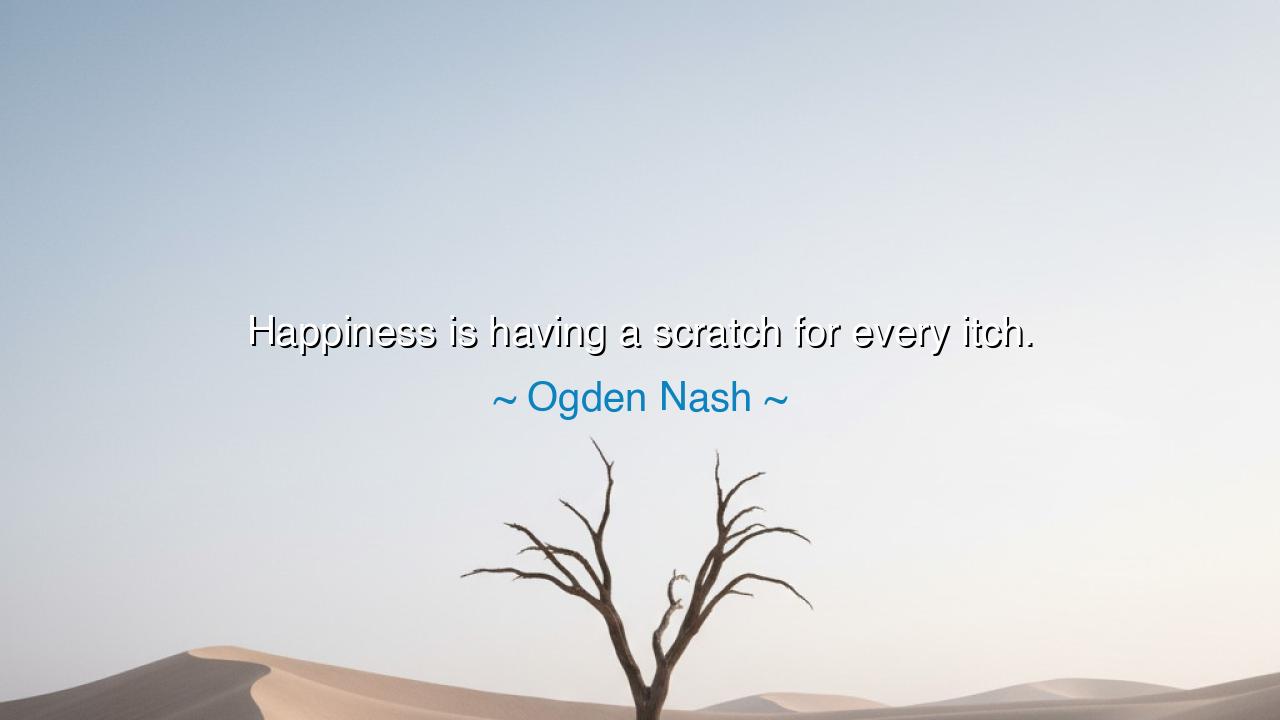
Happiness is having a scratch for every itch.






"Happiness is having a scratch for every itch." So wrote Ogden Nash, the poet of wit and wisdom, whose humor masked a philosopher’s heart. In this brief jest, he captures a truth as ancient as the human longing itself: that happiness is not some grand, distant treasure, but the simple harmony between desire and fulfillment, between what the heart yearns for and what life provides. Yet, as all wise souls know, such harmony is fleeting, fragile, and often found in the smallest of things.
In the days of the ancients, philosophers spoke endlessly of this pursuit. The Greeks called it eudaimonia—the good life, the flourishing of the soul. But Nash, with the humor of a sage disguised in laughter, simplifies the idea: to be happy is to have one’s needs met in balance. Each itch—whether of the body, mind, or spirit—must find its scratch, its moment of relief and satisfaction. Yet how often do mortals chase after endless itches, multiplying their desires faster than life can soothe them? When one longing is sated, another arises. Thus, happiness is not in the abundance of scratches, but in the wisdom to desire only what can truly be soothed.
To understand Nash’s meaning, one must look deeper. He does not praise indulgence, but balance. Every life carries its restlessness—hungers for love, comfort, recognition, or peace. The art of living is to match one’s cravings with the world’s offerings, neither demanding the impossible nor denying the possible. Happiness lies not in eliminating desire, but in understanding it, mastering it, shaping it into a rhythm that life can answer. To have “a scratch for every itch” is to live neither in starvation nor excess, but in harmony with one’s nature and circumstances.
Consider the tale of Diogenes, the philosopher who lived in a barrel. When Alexander the Great offered him wealth and power, Diogenes merely said, “Stand out of my sunlight.” To him, this was enough—to have what he needed and need what he had. His happiness was complete because his itches were few and his scratches simple: sunlight, freedom, and truth. In contrast, Alexander, who possessed the world, confessed, “If I were not Alexander, I would wish to be Diogenes.” Thus, Nash’s playful saying becomes a profound revelation: those who are content with little live closest to bliss.
Happiness, then, is not an endless feast, but a well-cooked meal. It is not the possession of all things, but the alignment of one’s inner world with one’s outer reality. A man may live in a palace and still itch with envy; another may live in a cottage and rest in peace. To “have a scratch for every itch” is to live awake to one’s needs yet free from their tyranny. It is to accept the world as it comes, finding gratitude even in imperfection, and joy even in small reliefs.
Even in our modern world, this truth endures. The one who seeks happiness through endless consumption, fame, or distraction will find only new itches with every gain. But the one who pauses, breathes, and cherishes the simple pleasures—warm food, honest love, restful sleep, good laughter—will find that life, even in its simplicity, provides enough. It is not the abundance of scratches that brings happiness, but the wisdom to be content with those one already has.
So, my children of tomorrow, remember this: do not curse your itches, for they remind you that you are alive. But do not let them rule you, lest you live forever scratching at shadows. Learn to know your true needs, and life will grant you enough to meet them. Seek balance, gratitude, and simplicity. For as Ogden Nash reminds us with a smile that hides eternal truth, happiness is not some distant dream—it is the gentle peace of a soul that finds its scratch for every itch.






AAdministratorAdministrator
Welcome, honored guests. Please leave a comment, we will respond soon